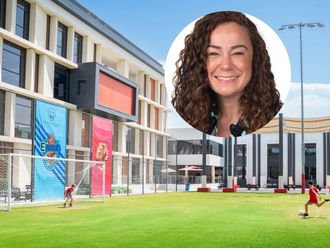Abu Dhabi: The rapid pace of growth in the capital requires that emergency response authorities regularly evaluate hazard risks, a leading disaster medicine specialist said in the capital on Monday.
Unlike smaller cities, these evaluations could be undertaken annually so that emergency response personnel are familiar with changing scenarios and resources, and are therefore adequately prepared to deal with emergencies and disasters when they occur, Dr Gregory Ciottone, disaster medicine specialist and assistant professor at Harvard Medicine School, told Gulf News.
A series of workshops, conferences and courses is therefore being undertaken by the Abu Dhabi Police in collaboration with Harvard Medical Faculty to train people involved in disaster response, including nurses, paramedics, police officers, army officers and decision makers. The first conference and workshop of the series, which could last for at least five years, began in the capital on Sunday.
“If I were an Abu Dhabi resident, I would be very comfortable and confident in my government’s ability to deal with disasters and emergencies, especially as very few cities undertake such training in preparedness for emergency scenarios,” said Dr Ciottone, who is also chair of the conference’s scientific committee. “Moreover, I have noticed that paramedics here are well-trained, and that the equipment [required to conduct rescue efforts and provide treatment] is outstanding.”
According to details revealed at the conference, Abu Dhabi Police search and rescue teams recently provided medical assistance in the Philippines following the devastation of Typhoon Haiyan.
The three-day conference, which ends on Tuesday, focuses on topics such as mass gatherings, disaster planning, emergency medicine ethics, in-flight incidents, resuscitation and negotiation skills. Organisers said that about 500 people are expected to attend.
“The UAE is currently working to build an academy of trained emergency medicine workers, and also to include disaster medicine as an accredited field of study for Bachelors and Masters degrees available in the country,” said Lieutenant General Saif Al Shafar, undersecretary at the Ministry of Interior.
One of the main goals of the conference is to ensure that various departments that need to collaborate during an emergency are used to working together.
“The first time multiple agencies coordinate should not be after an emergency has occurred, especially as this is when there is general chaos and the lack of a working plan can simply add to the confusion,” Dr Ciottone said.
The expert also explained that hazard evaluations should define threats that are actually possible in a particular region and situation. For example, this means measuring the risk and preparedness in case of a car crash or an earthquake in Abu Dhabi rather than that of a snowstorm.
“In addition, the first 72 hours of a disaster are very crucial, as response personnel only have access to locally available resources and personnel at this time,” he said. “This is because it takes a while for international aid to reach any place in the world. So it is essential that local emergency medicine professionals, firefighters and police are trained to handle needs during this period.
“An official also needs to be selected to act as overall disaster response commander, and we will work with local authorities to select and designate this commander.”
Major General Dr Ahmad Al Raisi, director general of central operations at the Abu Dhabi Police, said the series of conferences will help strengthen emergency medicine infrastructure and capabilities.
“In turn, this will ensure excellence in public safety and crisis management,” he said.












